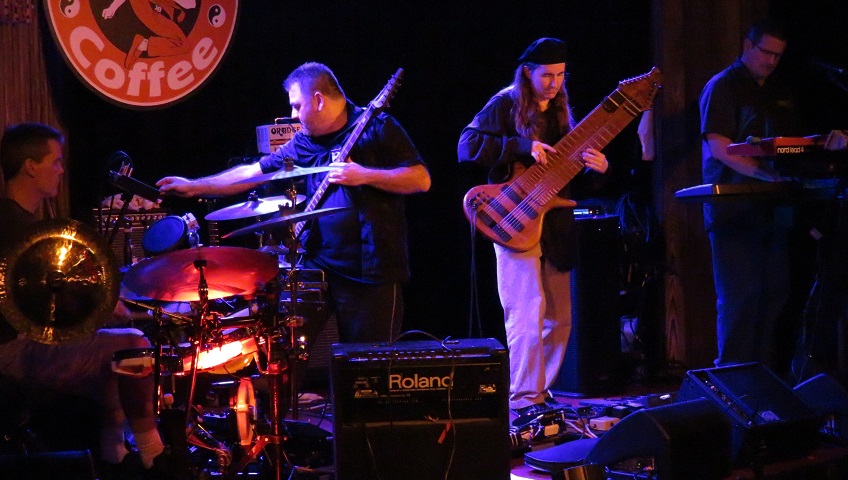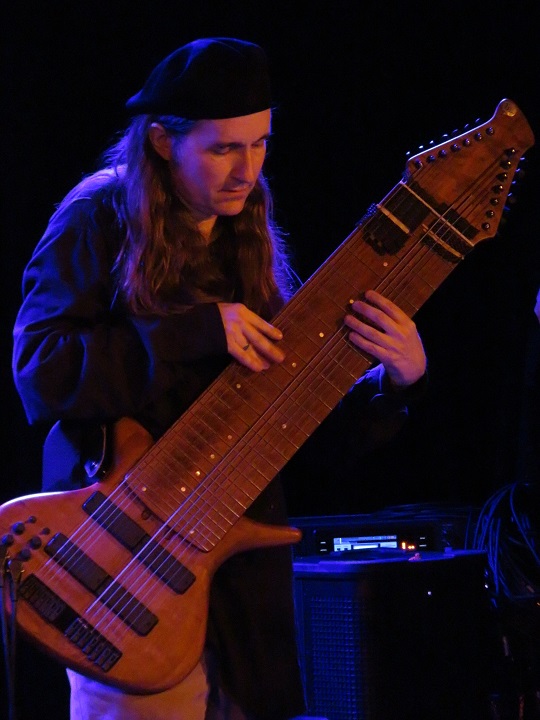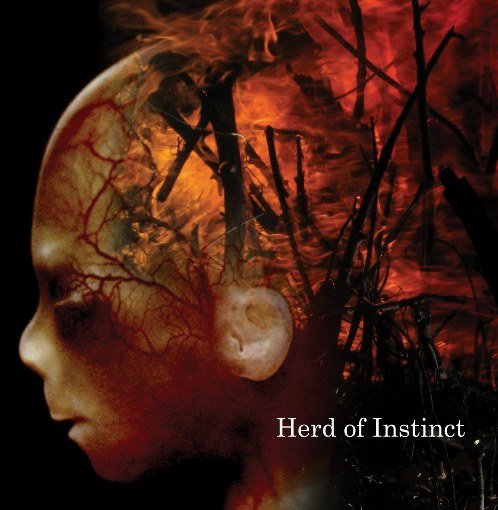
Exposé Online
What's old
Exposé print issues (1993-2011)
- 1 (October 1993)
- 2 (February 1994)
- 3 (May 1994)
- 4 (August 1994)
- 5 (October 1994)
- 6 (March 1995)
- 7 (July 1995)
- 8 (November 1995)
- 9 (March 1996)
- 10 (August 1996)
- 11 (February 1997)
- 12 (May 1997)
- 13 (October 1997)
- 14 (February 1998)
- 15 (July 1998)
- 16 (January 1999)
- 17 (April 1999)
- 18 (November 1999)
- 19 (May 2000)
- 20 (October 2000)
- 21 (March 2001)
- 22 (July 2001)
- 23 (December 2001)
- 24 (April 2002)
- 25 (September 2002)
- 26 (February 2003)
- 27 (August 2003)
- 28 (December 2003)
- 29 (April 2004)
- 30 (September 2004)
- 31 (March 2005)
- 32 (September 2005)
- 33 (May 2006)
- 34 (March 2007)
- 35 (January 2008)
- 36 (October 2008)
- 37 (July 2009)
- 38 (July 2010)
- 39 (Summer 2011)
Features
Walking the Edge of the Firepool —
The Herd of Instinct Interview

When their first album appeared in 2011, Herd of Instinct jumped to a position of prominence among American progressive rock bands. In conjunction with their appearance at the 2016 Voyager Festival in Austin, Texas, I was able to ask Mark Cook a few questions about the band and its music.
by Jon Davis, Published 2016-09-03
photography by Angel Stephens
 What are your earliest musical memories? How did your conception of music develop in your life?
What are your earliest musical memories? How did your conception of music develop in your life?
My earliest memories of music are my parents playing Elvis and seeing Kiss on TV. The first musician to make an impact on me was Gary Numan. The Pleasure Principle was the first album I bought when I was about 8 or 9. As I got older, I started listening to a wide variety of music, which lead me to progressive rock and fusion — Mahavishnu Orchestra, King Crimson, Peter Gabriel, Rush, and Miles Davis. I like music that takes me on a journey. Now my listening tastes are completely schizophrenic. I'll put on spacey dub music, or a pop band like The Blue Nile, because they are completely different from what I do as a musician. I also love music that really pushes the envelope. The recent Scott Walker releases The Drift, Bisch Bosch, and Soused are amazing works of art. These albums are challenging, and definitely not for everybody.
What kind of formal schooling do you have in music?
I studied music theory in college, but ended up getting an art degree. I enjoyed the freedom of visual arts over the defined approach to music that the music department followed at the university I attended. The art department was about creating something unique and new. When I studied music in school the focus was about the way the masters composed.
How did you get into tapping instruments? Did you play guitar or bass first?
I played guitar in a band that could never find a bass player. I was listening to the 80s King Crimson albums and became obsessed with Tony Levin's Chapman Stick playing. It seemed like a logical direction to pursue. Tapping instruments are still relatively new, so it was an opportunity to explore a new approach. I played the Stick for a few years. I love the Stick's unique sound, but the most important change in my playing came when the Warr guitar became available. It's the ideal instrument for me, because it combines both tapping and the tone of a guitar and bass.
 Tell me about how Herd of Instinct came into existence.
Tell me about how Herd of Instinct came into existence.
Jason Spradlin, the original drummer in HOI, and I had a trio for a few years with a vocalist. When that dissolved, he and I wanted to continue working. We already knew a guitarist we wanted to work with named Mike Davison. While this new trio started writing, I was also collaborating with another Warr guitarist / bassist named Dave Streett. As the writing for both projects progressed, it became apparent the music and direction was so similar that we decided to combine the music and release it as Herd of Instinct. Dave flew to Texas to help us work on mixes for the first album. Markus Reuter was also in Texas at that time working with Pat Mastelotto. He came for a few days to record and help us with the mix. After we finished the recording, we shopped it around to a few labels. We got two offers, but both deals would have given the labels the publishing rights. That's when Gayle Ellett stepped in with the opportunity for HOI to be on Firepool Records. He and Chuck Oken, Jr. were planning on releasing music outside of Djam Karet. They are very supportive of other artists.
Most HOI tracks are credited as group compositions. How does HOI music come together?
HOI music is created by two different approaches. The first method is the group will get together with chord or riff ideas and work as a unit. The second approach is I'll create the structure and the harmonic content for the piece. The other musicians will then interpret and flesh out the composition. "Time and Again" and "Gridlock" on the new CD were written with Rick, Ross, and I in the same room trying to figure out different ways of combining the Warr guitar and Stick. "Manifestation Pt.2" and "Baba Yaga" are pieces I put together. The other musicians then interpret the parts or add new elements. We usually have guest musicians to add depth to the sound. I love density and texture. We add horns or violin to help make our sound more layered. This part of the process is usually done after the music is arranged and recorded. One of the most important guest collaborators for HOI is a fantastic flute / sax player named Bob Fisher. He's featured on all of our albums and on my side project Spoke of Shadows. I think of HOI as more of a collective rather than a defined group of players.
How much improvisation is there in HOI music?
Generally the music is composed. The solos, intros, and outros do usually have improvisational elements. We'll start a song with two or three minutes of ambience that is different every time we play it. I tend to improvise about half of my solos when we play live to keep the music fresh.
 How did you hook up with Gayle Ellett and Colin Edwin?
How did you hook up with Gayle Ellett and Colin Edwin?
During the writing stage for the first album, Dave Streett and I were looking for players to enhance the music. He reached out to Gayle to contribute to the CD. When I started working on the second album, I immediately asked Gayle to participate. He has ended up being extremely important to the overall sound of the band. He also helps me finalize the mixes. On the second album, we thought it would be interesting to bring in a second bassist for a few songs. Colin was our first choice because his playing in Porcupine Tree is so outstanding. He is always melodic and supportive to the needs of the music. We sent him a few tracks and thankfully he agreed to participate.
What kinds of live performances has HOI done? How much do you adapt your music to go from studio to stage?
When we formed, we initially played a lot of local gigs to help prepare us for recording. After the second album, we only played a few shows. The original trio added Mike McGary on keyboards for live performances. Gayle lives in California, so we can't afford to have him fly in for a random gig. The last performance of the original HOI lineup was ProgDay 2013 in North Carolina. It took about a year to put the new band together and record Manifestation. The new quartet is definitely a stronger live unit. We're looking forward to playing VoyagerFest in Austin!
How does a non-mainstream band like HOI operate in today’s world? Day jobs? Grants? Patrons? Crowd-funding?
Everybody in the band has day jobs — except Gayle. He's a full time musician. Luckily with today's technology, we do much of our recording outside of a studio. Everybody in the band has a home studio, so we're able to do a lot of work with file sharing. Our albums are sold through CDBaby and also a few distributors purchase copies to sale online or in music stores.
What’s in the future for HOI?
We're currently focusing on playing shows. I do have a few pieces for the next album recorded. There will be some change in sound because I feel a need to experiment with the vocabulary of the band a bit to keep it interesting. I still don't think the band has made a solid statement yet!
Filed under: Interviews
Related artist(s): Herd of Instinct, Pat Mastelotto, Markus Reuter, Gayle Ellett, Colin Edwin
What's new
These are the most recent changes made to artists, releases, and articles.
- Review: Exit - Dove Va la Tua Strada?
Published 2026-03-01 - Review: Steve Tibbetts - Close
Published 2026-02-28 - Release: We Stood Like Kings - Pinocchio
Updated 2026-02-27 19:24:02 - Release: Stephen Grew - Pianoply
Updated 2026-02-27 19:20:11 - Release: Thierry Zaboitzeff - Artefacts
Updated 2026-02-27 00:16:46 - Review: Kevin Kastning - Codex I & Codex II
Published 2026-02-27 - Release: Zan Zone - The Rock Is Still Rollin'
Updated 2026-02-26 23:26:09 - Release: The Leemoo Gang - A Family Business
Updated 2026-02-26 23:07:29 - Release: Ciolkowska - Bomba Nastoyashchego
Updated 2026-02-26 13:08:55 - Review: Immensity Crumb - Chamber Music for Sleeping Giants
Published 2026-02-26 - Release: The Gatekeepers - Diary of a Teenage Prophet
Updated 2026-02-25 15:55:58 - Listen and discover: Mordecai Smyth will not break your back
Published 2026-02-25 - Review: Mars Lasar - Grand Canyon
Published 2026-02-25 - Release: Tashi Wada - What Is Not Strange?
Updated 2026-02-24 14:56:16 - Artist: Tashi Wada
Updated 2026-02-24 14:54:34 - Release: Greg Segal - Maintain!
Updated 2026-02-24 00:38:03 - Review: Il Segno del Comando - Sublimazione - Live
Published 2026-02-24 - Review: Nektar - Mission to Mars & Fortyfied
Published 2026-02-23
